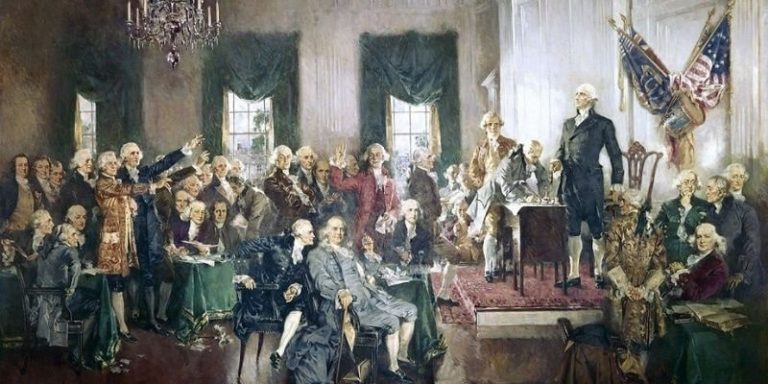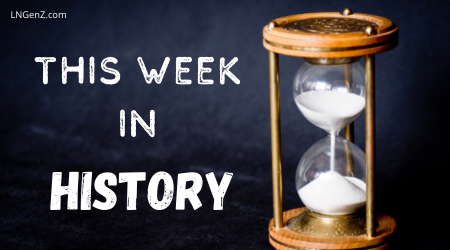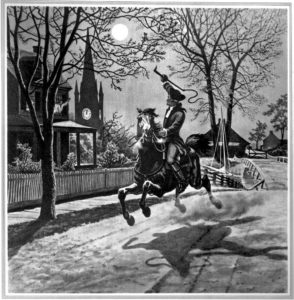This Week in History: January 1 – 7
George Washington delivers the nation’s very first State of the Union address.
By: Kelli Ballard | January 1, 2023 | 900 Words

(Photo by GraphicaArtis/Getty Images)
“Memoirs are the backstairs of history.” ~ George Meredith
January 8, 1790: George Washington Delivers First State of the Union Address
America’s Founding Father and first president, George Washington, had a very difficult task ahead of him. Not only was he the commander-in-chief in the New World, but all eyes were on him to see how future presidents should conduct themselves and how this new government should be managed. He did have some guidance in the form of the new Constitution, and one of those duties included giving Congress updates. According to Article II, Section 3, Clause 1 of the Constitution, the president “shall from time to time give to Congress Information of the State of the Union, and recommend to their Consideration such Measures as he shall judge necessary and expedient.”
On January 8, 1780, Washington addressed Congress at Federal Hall in New York City, but with caution. He first congratulated North Carolina for joining the federal republic and talked about improvements and areas to concentrate on for the future health of the country. “I embrace with great satisfaction the opportunity, which now presents itself, of congratulating you on the present favorable prospects of our public affairs,” he said in the opening of his speech.
As a military man, Washington knew the importance of having a way to protect the country and its citizens, but to require a regular army was a touchy subject for the colonists, who had just gone through a war to gain their independence. He argued that “providing for the common defence will merit particular regard. To be prepared for war is one of the most effectual means of preserving peace. A free people ought not only to be armed but disciplined.”
Aside from protecting the country, President Washington also encouraged developing agriculture, commerce and manufacturing, and literature and science, according to History.com. To achieve this, a federal post office and public education system would be needed. “Knowledge is in every country the surest basis of public happiness,” he said, and then added:
“To the security of a free Constitution it contributes in various ways: By convincing those, who are entrusted with the public administration, that every valuable end of government is best answered by the enlightened confidence of the people: And by teaching the people themselves to know and to value their own rights.”
Other Notable History Mentions
 January 1: New Year’s Day.
January 1: New Year’s Day.
January 1, 1502: Discovery of Rio de Janeiro (River of January) after Portuguese explorers landed at Guanabara Bay.
January 1, 1660: Samuel Pepys began his diary, which included life in London, the Great Fire of 1666, and the Great Plague of 1664-65.
January 1, 1776: George Washington unveiled the Grand Union Flag during the American Revolution.
January 1, 1801: Ireland was added to Great Britain, which became the United Kingdom of Great Britain and Ireland.
January 1, 1863: Abraham Lincoln’s Emancipation Proclamation freed the slaves in the South.
January 1, 1877: Queen Victoria became the Empress of India.
January 1, 1892: Ellis Island opened. Over the years, more than 20 million immigrants arrived in America here.
January 1, 1901: The Commonwealth of Australia was founded.
January 1, 1942: The Declaration of the United Nations was signed by 26 countries to reaffirm opposition to Axis powers.
January 1, 1959: Fidel Castro took control of Cuba after leading a revolution and then established a communist dictatorship.
January 1, 1973: Britain, Denmark, and Ireland became members of the Common Market (EEC).
January 1, 1975: President Richard Nixon’s aids were found guilty of obstruction of justice during the Watergate scandal.
January 2, 1960: Senator John F. Kennedy announced he was seeking the Democratic presidential nomination.
January 3, 1924: The sarcophagus of Tutankhamen (King Tut) was discovered by Howard Carter, a British Egyptologist.
January 3, 1959: Alaska became the 49th state in the Union.
January 4, 1974: President Nixon refused subpoenas from the Senate Watergate Committee. He had been asked to hand over audio tapes and other documents.
January 5, 1925: Nellie Tayloe Ross became the first female governor to be inaugurated in America.
January 5, 1972: President Nixon signed a bill that gave $5.5 billion to test the NASA space shuttle for six years.
January 6, 1066: Harold, Earl of Wessex, became King of England. In October of the same year, he was defeated by William the Conqueror.
January 6, 1941: President Franklin Roosevelt delivered his State of the Union address.
January 7, 1714: British inventor Henry Mill was issued a patent for the first typewriter “for the impressing or transcribing of letters singly or progressively one after another, as in writing.”

Paul Revere (Photo by Interim Archives/Getty Images)
January 7, 1782: Bank of North America was opened in Philadelphia, becoming the first commercial US bank.
January 7, 1999: The impeachment trial of President Bill Clinton began. This was the first in 130 years.
Famous Birthdays
Paul Revere (January 1, 1735) was born in Boston, Massachusetts. An American patriot, he is best known for his Midnight Ride to warn Americans that the British were planning to raid.
Betsy Ross (January 1, 1752) was born in Philadelphia, Pennsylvania. A seamstress, she helped sew the Stars and Stripes flag in 1776.
Louis Braille (January 4, 1809) was born in France. He became blind as a boy and invented the punch marks in paper reading system, or Braille, still used today for blind readers.
Joan of Arc (January 6, 1412) was born in France. She was an inspiration to French troops during the Hundred Years’ War and later, in 1920, the Roman Catholic Church canonized her as a saint.
Millard Fillmore (January 7, 1800) was born in Cayuga County, New York, in a log cabin. He was the 13th president of the US.
















